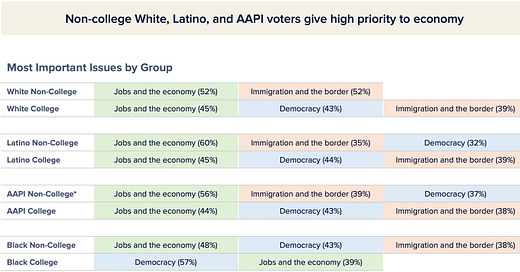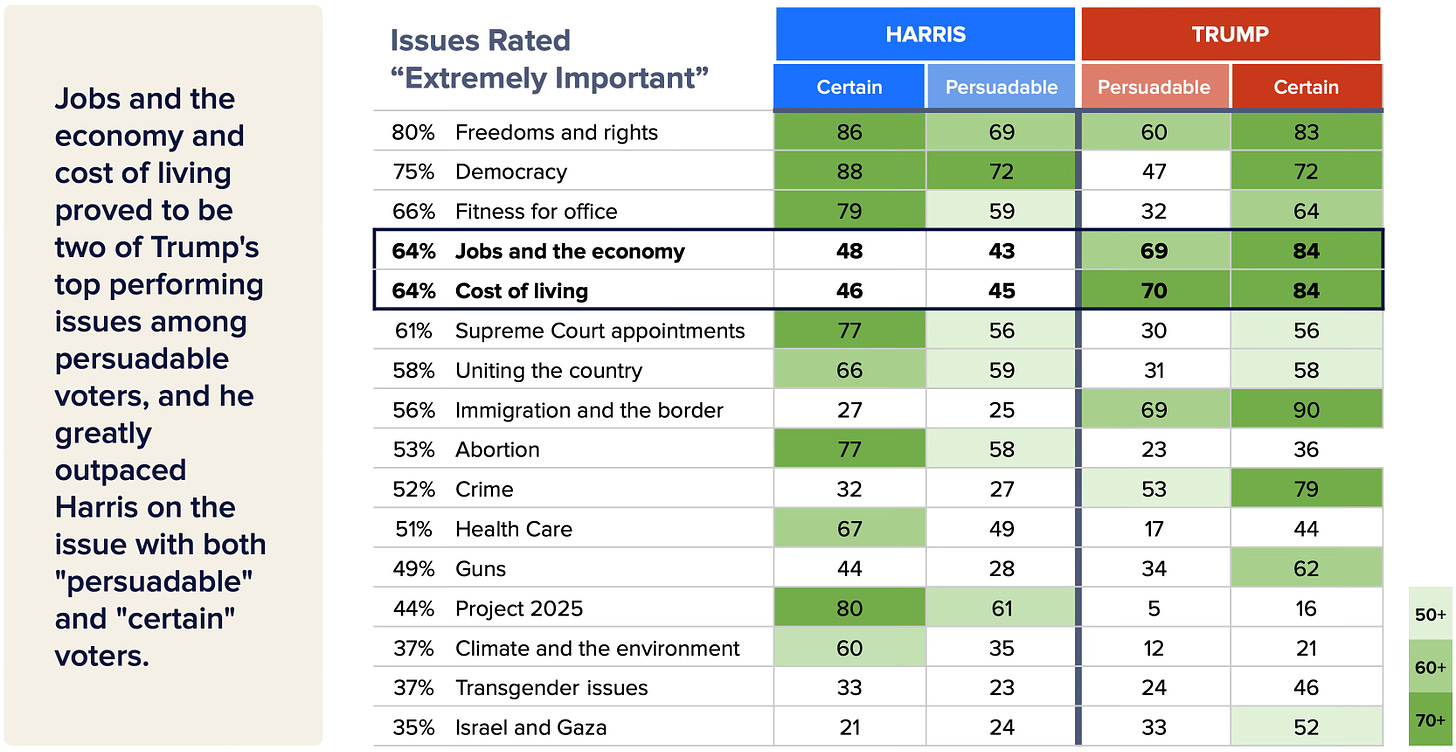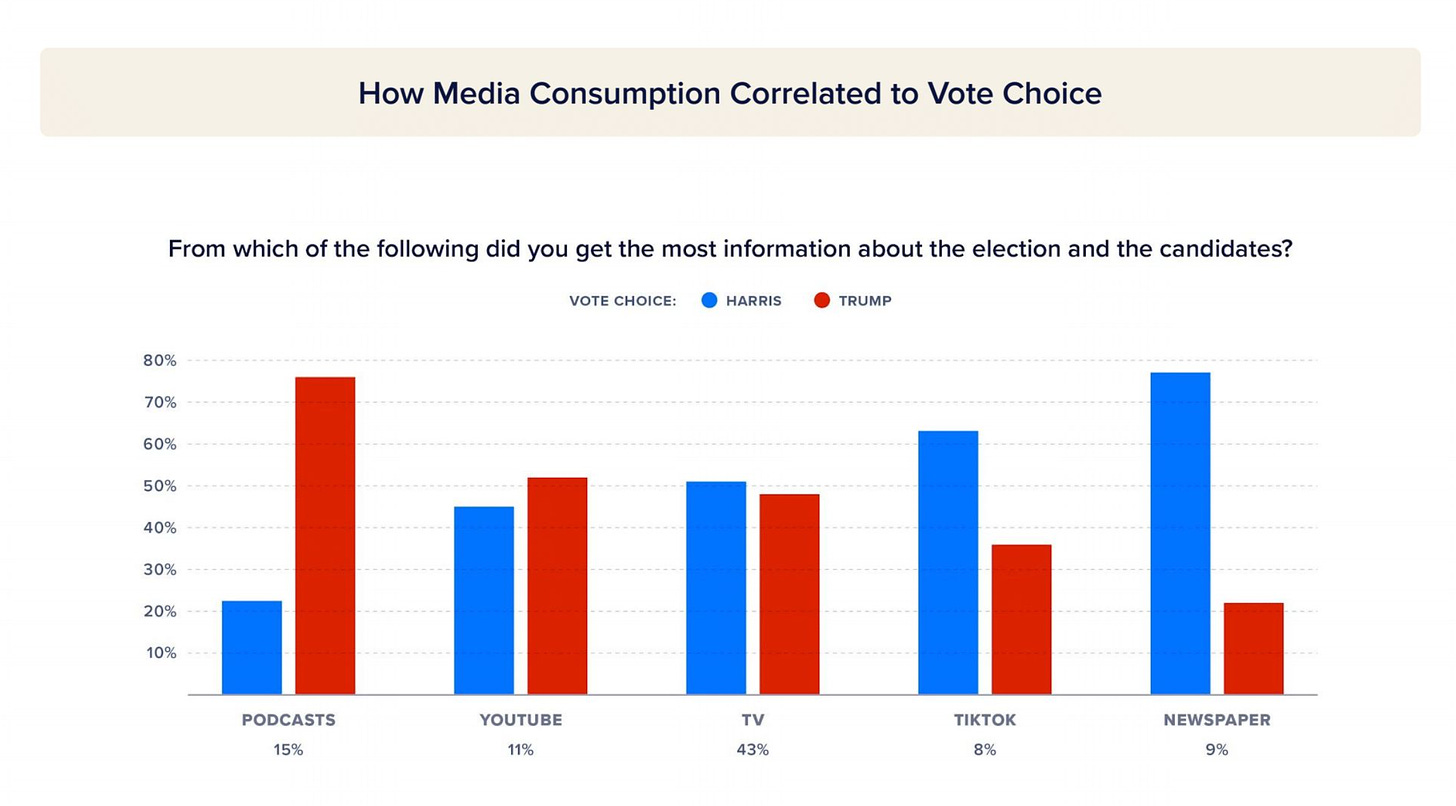“We can't rely on the truth or the facts to get us through this”
A new look into the minds of voters
Welcome to a Thursday night edition of Progress Report.
Tonight we’ve got a little morsel of a scoop and then a reported deep dive into a brand new study of how voters made their decisions last month and what lessons we can learn going forward. Tomorrow, we will have a bigger scoop and a big news roundup for paid subscribers that you won’t want to miss.
Note: This is a fully independent newsletter — no ads, no sponsors, no politicians able to apply pressure or influence what we cover and write. Progress Report relies entirely on readers and supporters willing to fund independent journalism and political thought.
This election showed that progressives desperately need to build up their own alternative political media infrastructure, and for just $5 a month, you can help keep us afloat and build the movement.
Labor pains: Kyrsten Sinema and Joe Manchin rushed back to the Senate chambers on Wednesday to deliver one final devastating blow to working families across the country. The duo, who are now technically independents after spending years stripping down and often outright blocking Democratic priorities, voted to kill the renomination of NLRB chair Lauren McFerran, which would have kept the labor board in liberal hands for another two years.
Donald Trump, who plans to fire the NLRB’s crusading pro-worker general counsel Jennifer Abbruzzo, will now have full control over the board, as well. He may have nominated a nominally union-friendly Secretary of Labor, but it’s overwhelmingly likely that his NLRB will overturn the historic set of pro-union rulings (like this new one) that have facilitated a major uptick in organizing, strikes, and new contracts.
Anticipating this, I’ve spent the past few working on a story about how Democratic state lawmakers plan to respond to the coming rollback of workers’ rights and nullification of big new rules put in place by the FTC and other agencies. Colorado state Rep. Javier Mabrey, a leading progressive, told me this week that he plans on backing a lot of legislation that protects those gains for Coloradoans.
“It’s pretty clear that the Trump administration is gonna be pretty serious about,m making sure that his wealthy buddies and that venture capitalists and Silicon Valley can run amok, unregulated, in this country,” Mabrey said. “I’ll be backing things like bans on algorithmic price setting, discriminating against renters, like algorithmic wage discrimination happening with companies like Uber and Lyft, and heat safety protections.”
Mabrey is also the lead sponsor of a bill that would fix Colorado’s uniquely undemocratic union formation elections. Much more on this story, from many additional states in the weeks to come…
The data shows a thirst for populism
For the last month, I’ve been diving into voting data, post-mortem polls, demographic numbers, and campaign storylines to try to understand just what led Democrats to such a catastrophic election defeat in November. Again and again, I’ve come back to Kamala Harris’s failure to embrace economic populism and the center-left’s longstanding failure to invest in progressive new media, conclusions that line up with a massive new study of working class swing state voters just released by Way to Win, a major Democratic Party-aligned PAC.
A product of multiple polls and voter panels that took place both before and after the election, the study found that significant rightward shifts by traditionally Democratic demographics were less a product of generational realignment than dire circumstances.
“Jobs and the economy proved to be the most motivating issue across race and education,” the group wrote in the study’s top-line summary. “The only voters who prioritized democracy over jobs and the economy were college-educated Black voters. Non-college Black voters along with college and non-college white, Latino, and AAPI voters all centered jobs and the economy as their top issue.”
Further, the study found 22% of voters were persuadable into the final stretch, and that they were predominantly men under 45, people of color, and self-described moderates. They broke for Trump by ten points, and were most concerned about the economy, not democracy or character — the exact things that Harris campaigned on in October.
Continuing the examination isn’t a matter of personal vindication. As a journalist, it’s my responsibility to make sure the truth prevails over a cynical, manufactured version of events. Critically, that will also help determine what comes next during a key inflection point for the Democratic Party and American society writ large. With that in mind, I spoke on Wednesday with Jenifer Fernandez Ancona, Way to Win’s Chief Strategy Officer, to explore the results of the organization’s study and extrapolate lessons for the immediate and long-term future.
This interview has been lightly edited for length and clarity.
Progress Report: Harris’s campaign managers have said economic attitudes made the race un-winnable for her. But Harris didn’t break from Biden, and refused to attack corporations. Had she done so, do you think she could have won?
Jenifer Fernandez Ancona: Given the global headwinds we were facing, I don't think any of us can say she absolutely could have won if she had done XYZ, but I think you're right that there was an opportunity to differentiate herself a bit more from Biden. She started out with a bit of a more of a populist message, talking about ending child poverty; we did a ton of research over 2023 and ‘24 and that [topic] just kept popping up from voters.
A lot of middle and working class voters that we listened to, both people of color and white people, it was very clear that they needed to hear a more populist message. Because otherwise they just blame the government, or they blame the “other” — whoever it may be that the Republicans are blaming, whether it's new immigrants or LGBTQ people. There was a lot of talk about funding the war in Ukraine, and that was also part of the story that Republicans were telling.
So when you don't lean into corporate greed, there’s a missing villain in the story, and people will attach that villain to something else. The research and data was showing that there was an opportunity to be more populist and we just don't know why they veered away from that. We don't know what would have been had they stuck to it. But I think going forward, we as Democrats have to be clear that this is who we are.
Progress Report: A president saying the economy is in rough shape isn’t intuitive as a winning strategy, but maybe they should have admitted things weren’t as rosy as they insisted.
Jenifer Fernandez Ancona: We were saying that all the way through: we get that these macro-economic indicators are good and that things are better in the traditional ways that we measure the economy, but how people are experiencing the economy in their day-to-day lives is not good for the vast majority of Americans. So trying to tell them that things were better when they were not feeling it, that was always the recipe for disaster.
Biden had other issues too. People were really concerned about his age for a long time. Naming your economic policy “Bidenomics” had two problems: Biden was unpopular and people were unhappy about the economy, so putting those two things together was challenging. Ultimately, Republicans really exploited it.
Progress Report: Things are rough for people, but through the NLRB, antitrust, and industry, the Biden administration did go big on some working class issues. Had he been able to talk coherently, perhaps people would have given some credit for it?
Jenifer Fernandez Ancona: The Big Lie of 2024 is that Democrats aren't actually working for regular Americans, that Democrats only care about this, “other,” whatever it may be. All of Biden's policies were geared toward helping working Americans. He did go to the picket line — he actually did embody that. But I think Biden's challenge was the communication, telling that story. It's embodying what it means to be a fighter for working people.
It was a little bit of a mismatch. It was 20th century campaign tactics, but we needed 21st century messaging and communication. There was something about the old school style of communication and not actually going to where people are picking fights. Being more in the fray of it could have helped.
Progress Report: Since 2017, Democrats consistently won elections by attacking Trump and tying Republicans to Trump, and they tried to do it again. But once he got a poll bounce after his felony convictions, it seemed like Americans had finally just accepted that he’s a crook and moved on.
Jenifer Fernandez Ancona: By the time we get to eight years into Trump, everybody pretty much understands who Trump is, and they don't really care who Trump is or what he says. The opportunity that we had in this election was answering the question of what will Trump's administration do? That was so much more important than who Trump is, and we were really fighting an uphill battle on that, because most voters did not believe that Trump would implement a lot of the things that he was saying.
Still, we didn't even really try to attack him on things like the mass deportation policy, which is not popular with voters when you actually talk it through with them and they understand what it means. I think we saw the Harris campaign talk too much about character and who he is and being unhinged, and the data showed that it didn't matter at the end of the day. We needed to have made the case for what he will do on the economy and immigration.
It was interesting to me that people felt as if Harris didn’t have policy positions, even though she released a flurry of white papers early on and announced more as she went. That was a talking point I read a lot in the political media, and also something Republicans said frequently.
Jenifer Fernandez Ancona: I think part of it is they don't pay attention, so they don't know [about Harris’s policies], but I think the other finding that we had in our polling was that people's impressions of Harris were very much matching what the Republicans and the conservative media ecosystem were saying about her. That was just one of the perceptions that they were pushing on her, that she didn't have any plans, even though that was not true.
Progress Report: Well, now he’ll actually start doing those things. How should Democrats respond?
Jenifer Fernandez Ancona: Our job is to make anything he does that's bad for the people who just voted him in, we have to make it stick to him. We can't expect what he does to just stick to him, because people may not know about them, and people may be getting wrong information.
We can't rely on the truth or the facts to get us through this. People aren't seeking political information. When they are listening to [Trump on] some of these culture podcasts, they're getting his spin on what's going on. We have to try to learn the lessons from this election: reaching people where they are, finding ways of working with content creators that people like. We also have to be disciplined with how we talk about things, so it doesn't feel like Whack-a-Mole all the time, but actually feels like we have a clear message we're driving about what he's doing.
Progress Report: That seems logical, but there are Democrats who are already sucking up to Trump or Elon Musk, praising DOGE and promising to work with them. Is there value in trying to get in with their audiences?
Jenifer Fernandez Ancona: I am on the side of we should be an opposition party, because we are an opposition party. I don't believe there's any value in working with him. We spent the whole election talking about how Trump wasn't a legitimate candidate, so he's also not a very legitimate president. I think that's what voters are looking for: A Democratic Party that will fight for them. And choosing to capitulate to him on some of these things, I don’t think is the smartest strategy. I think we will be better off if we actually lean into being the opposition.
It's hard for us, because Democrats want to use our power to actually help people and make people's lives better. Even seeing Bernie talking and Warren talking about wanting to work with him on some of these things, it's just hard for me. I would rather see us take a stand, be the opposition, and be really clear about the messaging to make this stuff stick to him.
It just doesn't feel fair. Every time we have power and they are the opposition party, they act like an opposition party, and they make our jobs harder.
Progress Report: Back to what you said about cultural media. I’ve told consultants that if I were to be given a blank check, I’d start a new media network that didn’t talk about politics more than incidentally for a full year, to build affinity with people. Then you can talk politics in ways that make sense.
Jenifer Fernandez Ancona: The message matters, but so does the way you reach people, and it's often not through politics or policy. A lot of it is cultural. Figuring out a way to speak to people like young men in a culture-first way is important, and so is figuring out how to reach them, which is not broadcast or cable television anymore.
Progress Report: Or 30-second ads on streaming weeks before an election.
Jenifer Fernandez Ancona: Advertising is important, but I think there needs to be a little bit of a re-reallocation of the resources toward these other forms of media. And not just in the very last couple of weeks, but honestly, years in advance. I think that's one of the things I really took away after digesting this polling. A lot of this dynamic that we saw play out really was put into place in 2021, 2022, and we saw it happening in real time.
It is kind of striking to me to look at it and understand that starting much earlier with some of these key narratives and driving them home in the places people are has to happen just years in advance. So that's important as we go into this next off-year.
Wait, Before You Leave!
Progress Report has raised over $7 million dollars for progressive candidates and causes, breaks national stories about corrupt politicians, and delivers incisive analysis, and goes deep into the grassroots.
None of the money we’ve raised for candidates and causes goes to producing this newsletter or all of the related projects we put out. In fact, it costs me money to do this. So, I need your help.
For just $5 a month, you can buy a premium subscription that includes:
Premium member-only newsletters with original reporting
Financing new projects and paying new reporters
Access to upcoming chats and live notes
You can also make a one-time donation to Progress Report’s GoFundMe campaign — doing so will earn you a shout-out in the next weekend edition of the newsletter!










That was well said. It resonates with my field of family counseling, because many parents are hesitant to set limits on behavior, for any number of reasons.
But if you let kids set their own limits, if you let kids parent themselves, they would never go to the dentist!
Thanks for this piece.